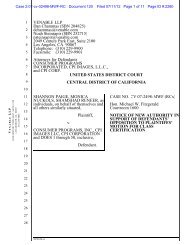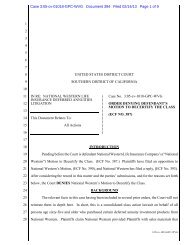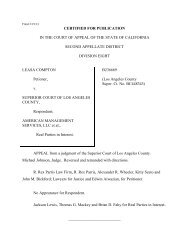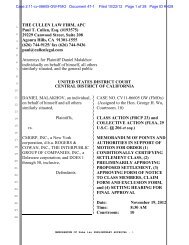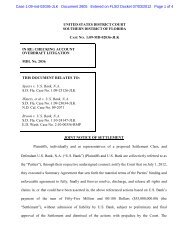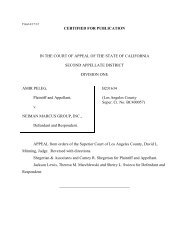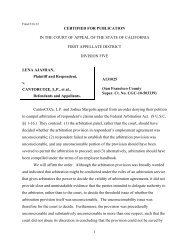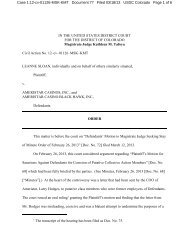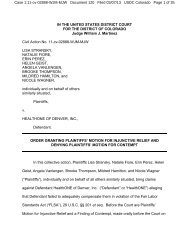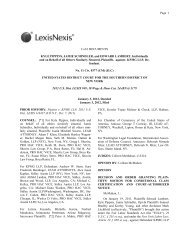here - Impact Litigation Journal
here - Impact Litigation Journal
here - Impact Litigation Journal
You also want an ePaper? Increase the reach of your titles
YUMPU automatically turns print PDFs into web optimized ePapers that Google loves.
2012 Tex. App. LEXIS 1089, *<br />
Page 10<br />
exceptional cases supported by both specific<br />
[*36] evidence on the record and detailed findings<br />
by the lower courts." Shipes, 987 F.2d at<br />
320.<br />
The trial court concluded its letter by stating that it<br />
had "accepted the billed amounts as the lodestar on the<br />
assumption that the Johnson factors have already been<br />
applied." From this snippet, the majority concludes that<br />
"it appears that the trial court did not complete the required<br />
steps" because the trial court "'assumed' that the<br />
Johnson factors were accounted for in Plaintiffs' calculations."<br />
Maj. Op. at 7. This is a misconstruction of the<br />
letter and of the trial court's attorneys' fees award. The<br />
mistake made by the majority is that it construes the letter's<br />
final sentence in isolation and apart from the remainder<br />
of the letter, which unambiguously indicates<br />
that the trial court had numerous concerns about the reasonableness<br />
of both the rates charged and the hours expended<br />
by the plaintiffs' attorneys. After explaining some<br />
of its concerns about the rates and hours, the trial court<br />
stated,<br />
Texas law seems clear that when<br />
Johnson factors are already accounted for<br />
in determining the reasonable rates (the<br />
lodestar amount), they should not again be<br />
considered when making adjustments. To<br />
rely [*37] on Johnson factors both to<br />
justify high rates and to justify the application<br />
of a multiplier would result in a<br />
duplicative award of fees.<br />
At the request of Stratton, the trial court conducted an<br />
exhaustive hearing on December 17, 2010, and t<strong>here</strong>after<br />
declined to modify the original Order and Final Judgment.<br />
Considering the letter as a whole, the trial court did<br />
not decline to adjust the lodestar because it merely "assumed"<br />
that the Johnson factors had already been accounted<br />
for in the lodestar; rather, it did take into account<br />
certain Johnson factors--and possibly all of the Johnson<br />
factors--in arriving at the presumptively reasonable lodestar<br />
and then either (1) refused to double count those<br />
same factors in considering a multiplier or (2) considered<br />
certain Johnson factors not addressed in calculating the<br />
lodestar as irrelevant for purposes of the multiplier. The<br />
trial court's inaction after permitting Stratton to supplement<br />
the record--thus maintaining an award of 100% of<br />
the lodestar, an amount within the range prescribed by<br />
rule 42(i)(1)--supports this conclusion. In light of the<br />
introductory warning that the letter was meant to clarify<br />
only "some of the reasons for the court's ruling," [*38]<br />
we have no way of knowing what Johnson factors, if not<br />
all of them, were considered in calculating the lodestar<br />
and what factors, if any, the trial court thought were irrelevant<br />
in considering a multiplier. What evidence we<br />
do have, however, does not demonstrate an abuse of discretion.<br />
Accordingly, to the extent that we address Stratton's<br />
third issue, I would affirm the trial court's judgment.<br />
For the foregoing reasons, I respectfully dissent.<br />
BILL MEIER<br />
JUSTICE<br />
DELIVERED: February 9, 2012



